CURRENT LITERATURE.
Poetical and Dramatic Works of Thomas Randolph. Edited by W. Carew Hazlitt. (Reeves and Turner.)—We may allow, without attach- ing much weight to, Mr. Hazlitt's plea for Randolph, that his works deserve republication as much or more than those of many other authors, though we cannot accept his criticism when he says that "of all minor English poets of his century, Randolph may, perhaps, be considered as standing at the head." Three names at once occur to us—Waller, and Cowley, and Herrick—as writers with whom Randolph can scarcely even be classed. A minor poet has achieved a genuine success, has distinguished himself from the mediocre poet, with whom he is too often confounded, if he achieved some small piece of perfection, as good in its way as" Blahs" and "Bneids " are in theirs. Such is Waller's "Go, lovely
Rose," such we may find in Herrick, if not in Cowley, but Randolph can show nothing of the kind. Ho has some good qualities, fancy, wit, a certain eloquence, and a capacity of writing dramatic verse of no small power. Yet, on the whole, his poems have an im- pression of dreariness and tediousness. There is little that is natural, we had almost said little that is genuine, in them. "The Jealous Lovers" was the longest, perhaps, we may say, the author's most important production. Passion is represented with force, but without any discriminating shade or subtlety. Let any one compare, for in- stance, the jealousy of Pamphilus with the delineation of the same passion in Othello. But there are fine passages, certainly. For instance:
" Physicians say there's no disease so dangerous As when the patient knows not he is sick. Such, such is mine; I could not be so ill, Did I but know I were not well. The tear Of dangers but suspected is more horrid Than present misery. I have seen a man During the storm shake at the thoughts of death:
Who when his eyes beheld a certain ruin
Died hugging of the wave. Were Evadne true, I were too blest; or could I say she's false,
I could no more he wretched,—I am well:
My pulse beats music, and my lively blood Dances a healthful measure. Ha what's this Gnaws at my heart ? what viperous shirt of Nessus Cleaves to my skin, and eats away my flesh ?
'Tis some infection."
Bat it may be doubted whether they repay the pains of all the unclean walking—for Randolph is unclean, though not so foully so as Carew— through which we reach them. Of the poet's life little is known. He was born in 1605 and was therefore nearly contemporary with Milton at Cambridge. In fact, as he went up rather later than was customary in those days, their University careers almost coincided, Milton entering in February, 1625, and Randolph graduating in 1627-28. He died before completing his thirtieth year. His friend, Dr. James Dupont, elegantly said of him, in reference to his early death,—
" Te Bed amicorum nobis males abstulit error, Ingeniique tel non moderatus amor. Immodicie brevis est tetas, et rare senectus, Htec tua culpa fuit,—ts placuisse nimis."
In plain English, he died from the results of intemperance.































 Previous page
Previous page